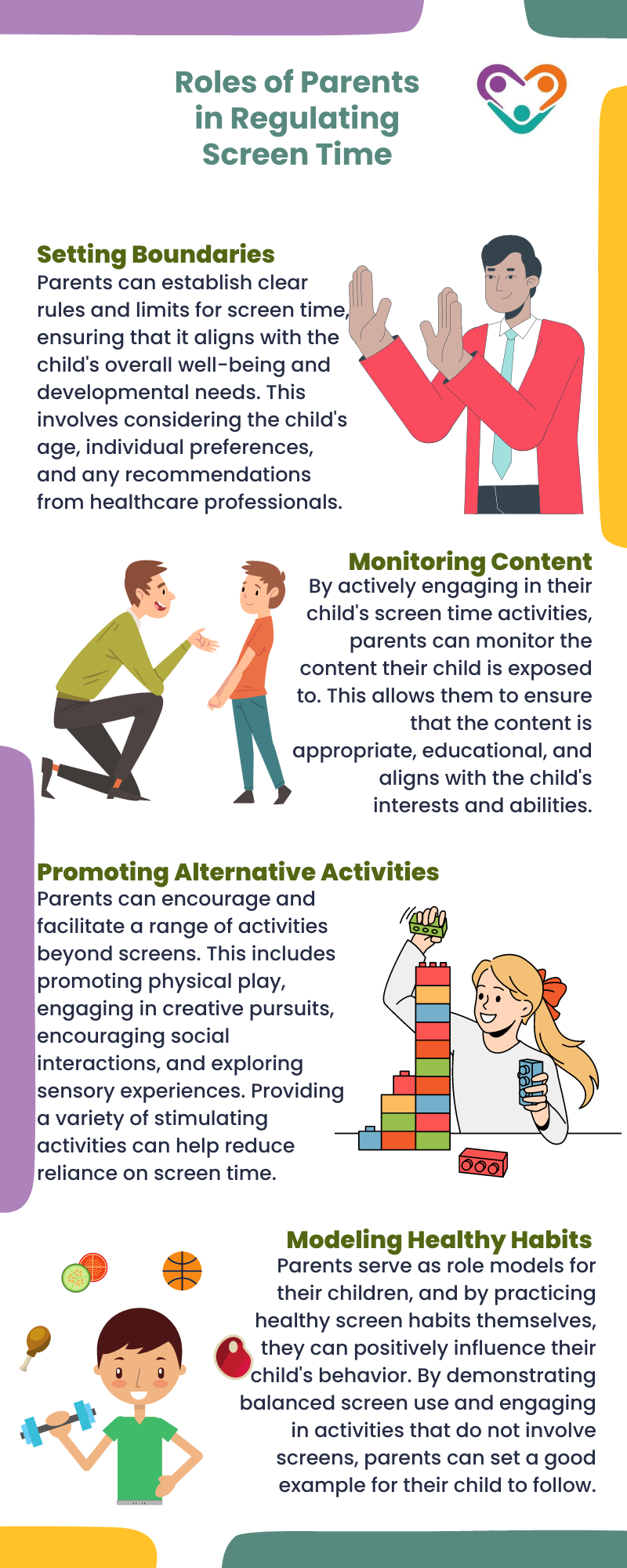According to research, there is a correlation between screen time and autism symptoms. A study revealed that longer durations of screen time among 1-year-old boys were “significantly associated” with autism spectrum disorder at 3 years old. It emphasized the importance of regulating and controlling a child’s screen time, especially among babies and toddlers.
In a study published by the Journal of Autism and Developmental Disorders, it was found that autistic children spend more time on screens compared to children without autism. About 64.2 percent of young adults with ASD spend their free time on TV and video games, while 13.2 percent engage in social media, emails, and chat.
Excessive screen exposure among individuals with autism has been associated with more severe ASD symptoms, particularly sensory issues, and can even lead to issues in brain development.
Let’s take a look at this matter in further detail.

Screen Time and Autism Symptoms
While examining the relationship between screen time and autism, researchers have uncovered correlations between screen time and various autism symptoms. Understanding these connections can provide valuable insights into the impact of screen time on individuals with Autism Spectrum Disorder (ASD).
The particular mentioned earlier highlighted that the longer the screen time, the more severe the symptoms of ASD. This correlation is particularly notable in sensory symptoms and developmental delays. Children with more severe autism at older ages tend to spend more time looking at video devices due to their inability to interact with other children.
However, it is important to note that this may indicate the severity of autism rather than a direct link to screen time itself.
Sensory Issues and Development
Sensory issues are a common characteristic of autism, and research has indicated a connection between screen time and sensory symptoms in individuals with ASD. Excessive screen time may exacerbate sensory overload and atypical sensory behaviors. This can include heightened sensitivity to certain visual stimuli or difficulties with sensory integration.
Furthermore, screen time has also been associated with developmental delays in children with autism. Prolonged exposure to screens may limit opportunities for social interaction and hinder the development of important skills.
This means that parents and caregivers should be mindful of the potential impact of screen time on sensory issues and development in individuals with autism.
Understanding the correlation between screen time and autism symptoms can guide parents and caregivers in making informed decisions about managing screen time for individuals with ASD. By implementing strategies to regulate and limit screen time, it is possible to promote healthy development and support individuals with autism in navigating their sensory experiences.
Screen Time Guidelines
It’s important to consider the recommendations and guidelines provided by experts as far as screen time for autistic children goes. The American Academy of Pediatrics (AAP) has established guidelines for screen time for children in general, and these guidelines can also be applied to children with ASD.
The AAP recommends no screen time for children younger than 18 to 24 months. This is because excessive screen time during this critical period of development can potentially have negative effects on speech, physical, and emotional development in children.
For children between the ages of 2 and 5 years, the AAP advises limiting screen time to no more than one hour per day. It is important to note that this one hour includes all types of screens, such as TVs, computers, tablets, and smartphones.
This recommendation is based on the understanding that excessive screen time can interfere with other important activities necessary for a child’s development, such as physical play, social interaction, and exploration of the environment.
However, it is worth mentioning that the AAP has clarified that video chatting with family members can be considered an acceptable form of screen time, particularly during the pandemic when there has been an increase in screen time and device usage. Video chatting allows children to maintain social connections and engage in meaningful interactions with loved ones.
Managing Screen Time for Children with ASD
Parents and caregivers of children with ASD should be particularly mindful of screen time and its potential impact on their child’s sensory and developmental needs. While the general screen time guidelines provided by the AAP can serve as a starting point, it is important to consider the individual needs and sensitivities of children with ASD.
Parent training and education play a crucial role in managing screen time for children with ASD. Understanding the potential risks associated with excessive screen time and the specific challenges that individuals with ASD may face can help parents establish appropriate limits and balance.
It is important to work closely with healthcare professionals and educators who specialize in ASD to develop personalized strategies for managing screen time that take into account the unique needs of the child.

Effects of Excessive Screen Time
Excessive screen time has been a topic of concern, particularly regarding its impact on individuals with autism spectrum disorder (ASD). Research has highlighted potential concerns related to brain development and social interaction challenges in individuals with ASD who engage in excessive screen time.
A study revealed a significant association between longer durations of screen time among 1-year-old boys and the development of autism spectrum disorder at 3 years old. This finding emphasizes the importance of regulating and controlling a child’s screen time, especially among babies and toddlers.
Excessive screen time during crucial developmental stages may have an impact on speech, physical, and emotional development in children.
Social Interaction Challenges
Excessive screen time can also impact social interaction skills. Children with autism may find it challenging to engage in face-to-face interactions and may rely on screens as a means of communication or entertainment.
While screen time may provide temporary relief from social difficulties, it is important to encourage and support alternative forms of social interaction to promote healthy social development.
According to research published in the Journal of Autism and Developmental Disorders, autistic individuals tend to spend more time on screens compared to their non-autistic peers. A significant percentage of young adults with ASD spend their free time watching TV, playing video games, or engaging in online activities.
This heavy reliance on screens may limit opportunities for real-world social interactions and hinder the development of vital social skills.
By being mindful of screen time and striking a balance between technology use and other activities, parents and caregivers can help mitigate the potential negative effects of excessive screen time on brain development and social interaction skills in individuals with autism spectrum disorder.
Encouraging a healthy balance of screen time with other activities, such as outdoor play, socializing, and engaging in hobbies, can support overall development and well-being.

Sensory Responses to Screen Time
Screen time can have a significant impact on sensory responses among autistic individuals. Parents and caregivers should consider two aspects that are tied to both autism and screen time.
These aspects are the following:
Sensory Overload Risks
Toddlers who are exposed to television or video viewing may exhibit atypical sensory behaviors, such as being disengaged, seeking more intense stimulation, or being overwhelmed by sensory inputs like loud sounds or bright lights. These children are more likely to develop behaviors such as “sensation seeking,” “sensation avoiding,” and “low registration” by 33 months old.
Prolonged exposure to screens, along with their fast-paced nature, can contribute to overstimulation, overwhelming the senses and leading to sensory overload.
Excessive screen time can also fuel sensory brain hyperconnectivity seen in autism spectrum disorders. This hyperconnectivity manifests as heightened brain responses to sensory stimulation, potentially exacerbating repetitive behaviors associated with ASD. Early-life screen time can play a role in this brain hyperconnectivity, potentially impacting the development of individuals with ASD.
Atypical Sensory Behaviors
Studies have also found that increased screen exposure is associated with more severe ASD symptoms, particularly sensory issues. Children with autism who have a history of excessive screen exposure may experience virtual autism, characterized by autism-like symptoms. These symptoms can include sensory challenges such as hypersensitivity or hyposensitivity to certain stimuli.
Children with ASD already face difficulties with sensory processing, and excessive screen time can further impact their sensory experiences. The fast-paced and visually stimulating nature of screens may reinforce and exacerbate repetitive behaviors commonly seen in individuals with autism.
Moreover, excessive screen use can hinder social interaction and communication, which are areas already challenging for children with ASD.
To mitigate the potential negative effects of screen time, parents and caregivers should be aware of the sensory responses of individuals with autism. Limiting screen time and providing alternative activities that promote sensory regulation and social interaction can help create a more supportive environment for individuals with ASD.
By prioritizing sensory well-being and considering the unique sensory needs of individuals with autism, we can help optimize their overall development and quality of life.
Parental Role in Regulating Screen Time
Needless to say, parents play a crucial role in regulating and managing their child’s screen time. Understanding the importance of parental involvement and implementing effective strategies can help create a healthy balance.
Parents are essential in guiding and monitoring their child’s screen time, especially for children with autism spectrum disorder (ASD). Here are some reasons why:

By taking an active role in regulating screen time and implementing effective strategies, parents can help their child with autism develop healthy habits while ensuring that screen time remains a balanced and beneficial part of their daily routine.
If you’re seeking specialized ABA therapy in New Jersey, Indiana, Georgia, and New York, Golden Care offers comprehensive services tailored to meet the unique needs of each individual. Contact us to learn more or book a consultation today.
Sources:
https://nortonchildrens.com/news/autism-and-screen-time
https://www.autismparentingmagazine.com/screen-time-kids-with-asd
https://www.earth.com/news/toddler-screen-time-linked-to-atypical-sensory-behaviors



